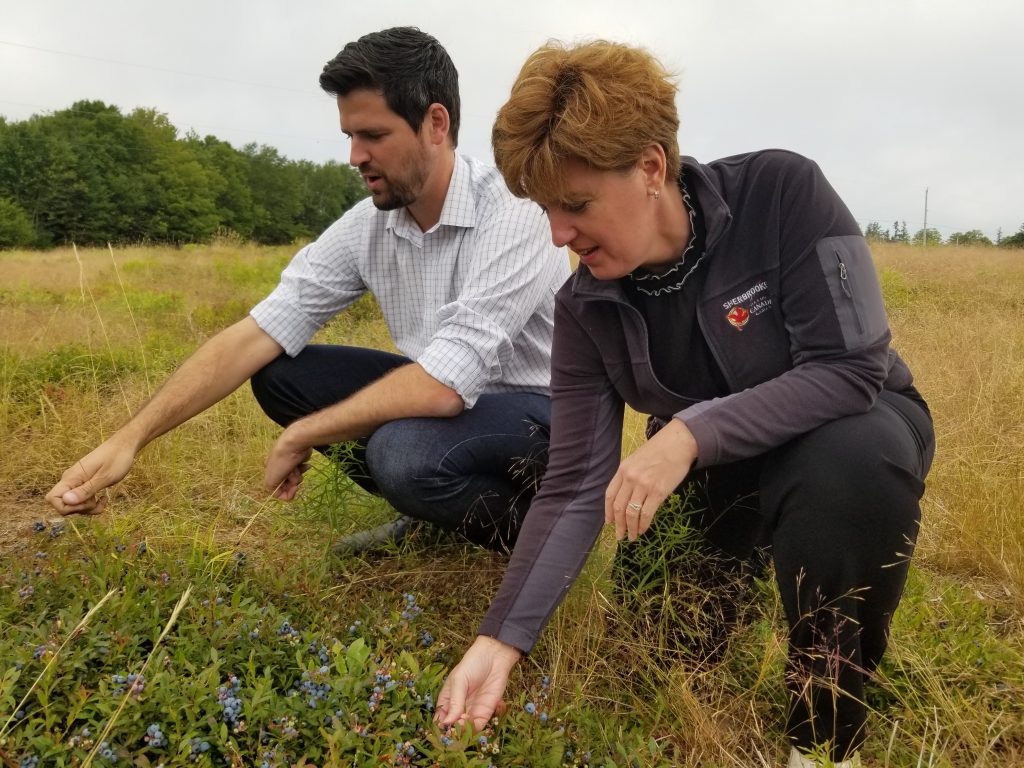
Features
Production
Research
Investing in honey bee health to support beekeepers and grow the blueberry sector
The project will help improve honey bee colony health, monitor and manage pests and diseases, improve overwintering success and promote biosecurity techniques for the sector.
August 16, 2019 By AAFC
 Central Nova MP Sean Fraser and Agriculture and Agri-Food Minister Marie-Claude Bibeau stop to pick fresh wild blueberries in a field at Glenmore Farms. AAFC
Central Nova MP Sean Fraser and Agriculture and Agri-Food Minister Marie-Claude Bibeau stop to pick fresh wild blueberries in a field at Glenmore Farms. AAFCIn an effort to increase pollination of wild blueberries, the government of Canada has invested in research supporting the health and productivity of the honey bee sector.
The Honourable Marie-Claude Bibeau, Minister of Agriculture and Agri-Food (AAFC), recently joined the Honourable Keith Colwell, the Nova Scotia Minister of Agriculture, on a visit to Glenmore Farms in Middle Musquodoboit, N.S., where they announced more than $800,000 in funding to support the health and productivity of the honey bee sector in Atlantic Canada to help pollinate wild blueberries in the region.
“The success of many of our agricultural crops depends on the health and productivity of our pollinators. Our Government is proud to support this regionally collaborative approach to strengthen Atlantic Canada’s honey bee populations that play such a vital role in high-value crops such as wild blueberries,” said Minister Bibeau.
AAFC estimates that 81 per cent of the total blueberry crop is linked to the delivery of honey bee pollination. In 2018, Canadian wild blueberry exports accounted for about half of Canada’s total fresh and frozen blueberry exports, which totaled $475 million, to 45 countries. The farm gate value of Canadian blueberries in 2018 was almost $244 million.
This project, led by the Atlantic Tech Transfer Team for Apiculture (ATTTA), is taking a regional approach to honey bee research in order to meet the pollination demands of the wild blueberry industry in Atlantic Canada. The project will help improve honey bee colony health, monitor and manage pests and diseases, improve overwintering success and promote biosecurity techniques for the sector.
ATTTA was created in 2016 as a joint initiative focused on strengthening the region’s honey bee population. This project is the next phase of a collaborative project that involved researching honeybee management information across the country to customize it for Atlantic Canada.
ATTTA is supported by Perennia Food and Agriculture Inc. Perennia is a provincially-owned development company that works with farmers, fishermen, processors and food entrepreneurs to grow their businesses. Services are offered in field services, quality and food safety and product development and commercialization.
“Perennia’s focus is transferring technology, sharing information and skills development. This is project that covers all those bases in two sectors that are key to the future success of Nova Scotia agriculture – beekeeping and wild blueberries. Having the apiarists as part of our team strengthens Perennia and allows us to support the project as the project team has access to all our specialists and professional services for all their needs,” said Lynne Godlien, CEO of Perennia.
The Province of Nova Scotia is collaborating with the federal government and the provinces of New Brunswick and Prince Edward Island to provide more than $700,000 of the total project costs under the Pan-Atlantic Agriculture Project Partnership Initiative (PAPPI).
An additional investment of $125,000 is being made through the Regional Collaborative Partnerships Program under the Canadian Agricultural Partnership that supports the collaboration of two or more provincial/territorial governments on projects to address shared priorities.
“New Brunswick recognizes the importance of having a strong honey bee sector and was pleased to provide financial support through the Canadian Agricultural Partnership initiative. This project will help strengthen our honey bee sector through research and technology transfer and supports our crops which rely on pollination for enhanced productivity. Pan-Atlantic collaborative projects such as this benefit the entire region and focus work on priority areas as identified by stakeholders,” said the honourable Ross Wetmore, New Brunswick Minister of Agriculture, Aquaculture and Fisheries.
Print this page